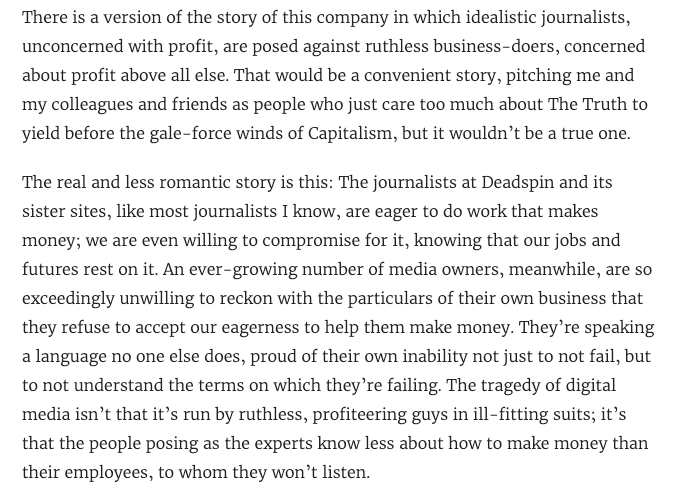Misnegation harvest
« previous post | next post »
Readers have recently sent two links to examples where writers seem to have lost control of piled-up negatives.
From Megan Greenwell, "The Adults in the Room", Deadspin 8/23/2019:
The journalists at Deadspin and its sister sites, like most journalists I know, are eager to do work that makes money; we are even willing to compromise for it, knowing that our jobs and futures rest on it. An ever-growing number of media owners, meanwhile, are so exceedingly unwilling to reckon with the particulars of their own business that they refuse to accept our eagerness to help them make money. They’re speaking a language no one else does, proud of their own inability not just to not fail, but to not understand the terms on which they’re failing. The tragedy of digital media isn’t that it’s run by ruthless, profiteering guys in ill-fitting suits; it’s that the people posing as the experts know less about how to make money than their employees, to whom they won’t listen.
G.H., who sent the link, comments:
In addition to the negations, the author's sarcasm adds another level of difficulty in trying to figure out just what the hell this sentence is saying. After some mental arithmetic I'm pretty sure the first part comes out correctly but the second part ("inability … to not understand") has gone wrong.
From Amanda Holpuch, "Prince Andrew denies seeing any suspicious Epstein behaviour", The Guardian 8/24/2019:
In a statement on Saturday, the Duke of York said there had been immense speculation about the convicted sex offender who killed himself in a New York jail earlier this month. […]
Andrew said he met Epstein in 1999 and saw him once or twice a year during the time he knew him, and also stayed at several of his residences.
“At no stage during the limited time I spent with him did I see, witness or suspect any behaviour of the sort that subsequently led to his arrest and conviction,” the duke said.
“I have said previously that it was a mistake and an error to see him after his release [from prison] in 2010 and I can only reiterate my regret that I was mistaken to think that what I thought I knew of him was evidently not the real person, given what we now know.”
N.R., who sent the link, comments:
I've spent a fair while unpacking this, but I still can't figure out if Andrew has in fact successfully un-misnegated his unapologetic non-apology, or not.
This sub-clause invites a substitution:
I was mistaken to think [the Epstein I thought I knew ≠ real Epstein, a sex-trafficking paedophile]
<=> I would have been correct in thinking [the Epstein I thought I knew = real Epstein, a sex-trafficking paedophile]
And, by some sophistry, we have found the opposite of the intended meaning: What Prince Andrew thought he knew of Epstein was … precisely that Epstein was a sex-trafficking paedophile – which Epstein, in fact, was, given what we now know.
But in that case, what is it exactly that Prince Andrew regrets? I'm not sure even he knows.
Interestingly, the expression reads perfectly as intended if we place each sub-clause in reverse order, beginning with the innermost:
What I thought I knew of Epstein was evidently not the real person, given what we now know. I was mistaken (about this). I can only reiterate my regret (about this).
Just an observation. There could be a general pattern here to do with recursively subordinated subclauses and negation by their respective main clauses. I'm not a linguist, but I'll think about it anyway.
The obligatory screenshots:


Greg Ransom said,
August 25, 2019 @ 1:06 pm
Hayek's original 1920 paper where he presents the Henn-Hayek synaptic connection model of learning, classification and memory is now published in English https://www.amazon.com/Writings-Foundations-Theoretical-Psychology-Collected/dp/022643642X/ Hayek's 1952 book influenced Rosenblat and Minksy, among others, and is cited in Rosenblatt's seminal "Perceptron" paper. Hayek's book was also circulated among the key memory guys during the cognitive revolution of the 1960s.
At one time you were interested in the details of the "discovery" priority and scientific impact of Hayek's contributions. See also now also neuroscientist Joaquin Fuster's essays on Hayek .
Coby Lubliner said,
August 25, 2019 @ 2:32 pm
If you just replace "I was mistaken to think" with "I mistakenly thought" then the sentence makes sense as intended. Standing alone the two are equivalent, but as objects of "regret that" they are not, since the finite verb that the regret refers to is "was mistaken" in the first case and "thought" in the second.
Andrew Usher said,
August 25, 2019 @ 7:23 pm
I think that's right – it's the kind of mix-up that would be common in spontaneous speech. Of course I don't believe he's expressing a true, sincere apology – not really any indictment, since any other public figure would do the same thing – and that insincerity might increase the chance of a grammatical slip-up like that, but it's certainly not a required condition.
On the other hand the first example, composed in writing, is just an incomprehensible mess. Since the rest of the article is more-or-less coherent, it is difficult to explain why that would have come about. The first correction I think of is to replace 'inability' with 'ability' – people aren't normally proud of what they can't do – and then the first part of the sentence seems right, but the second is still bizarre either way.
k_over_hbarc at yahoo dot com
Jerry Packard said,
August 25, 2019 @ 9:25 pm
Aren't these all semantically really clear, especially with the help of context?
GH said,
August 26, 2019 @ 12:18 am
@Jerry Packard:
If you think the intended meaning of the Deadspin sentence is clear, please explain it to me.
@Andrew Usher:
Given that the author is excoriating owners of media businesses, I think she does mean to accuse them of being proud of their "inability to not fail" (i.e. inability to succeed). My guess is that the template she has in mind is "proud of their ignorance", and that attempting to fit the accusation to that template is why it's phrased in so many negatives.
But while perverse pride in one's ignorance is a somewhat familiar concept, pride in inability to succeed is something I have a much harder time wrapping my head around, and I don't feel the rest of the article makes the case that that's what's going on.
The insertion of "not just" (which does not negate the following statement) into the chain of negations confuses the matter further, and the second prong of the statement appears straightforwardly misnegated.
It's such a trainwreck of a sentence that I'm afraid it I feel it somewhat undermines the author's argument about Deadspin's journalistic excellence.
Phillip Helbig said,
August 26, 2019 @ 2:43 am
I remember this one, allegedly from a Congressman: I would not be opposed to the repeal of the prohibition.
Phillip Helbig said,
August 26, 2019 @ 2:44 am
Then there as Nixon saying that during his presidency the rate of increase of inflation had decreased, the only time a President has ever used the third deriviative.
Jerry Friedman said,
August 26, 2019 @ 11:53 am
GH: I'm not Jerry Packard, but I'm going for
…they refuse to accept our eagerness to help them make money. They're speaking a language no one else does, proud of not just their inability to succeed, but also of their inability to understand the terms on which they're failing.
Rod Johnson said,
August 26, 2019 @ 7:43 pm
I am mystified by Greg Ransom's comment above.
Jerry Packard said,
August 27, 2019 @ 8:12 pm
@GH: My reading is that the writer intends to convey that they are proud of succeeding, and they are proud that they are not understood as failing.
M. Paul Shore said,
August 30, 2019 @ 2:48 pm
I know I’m straying into very emotionally and politically fraught territory by mentioning this; but seeing as one of Language Log’s core concerns is the studying and promotion of semantic precision, I have to take issue with reader N.R.’s characterization of Jeffrey Epstein as a “p[a]edophile”. There’s no question that he was an ephebophile, and he was most likely a hebephile as well; but I’m not aware of any evidence that he was a pedophile in the original, rationally defensible sense of that term.